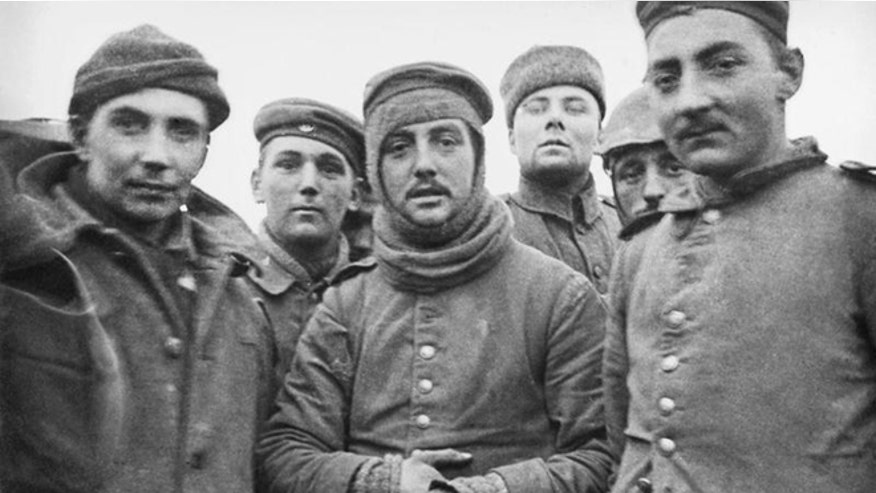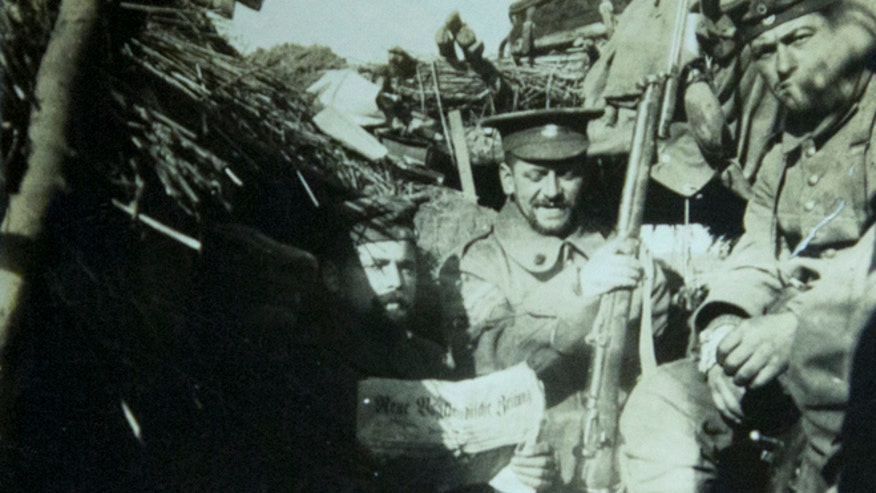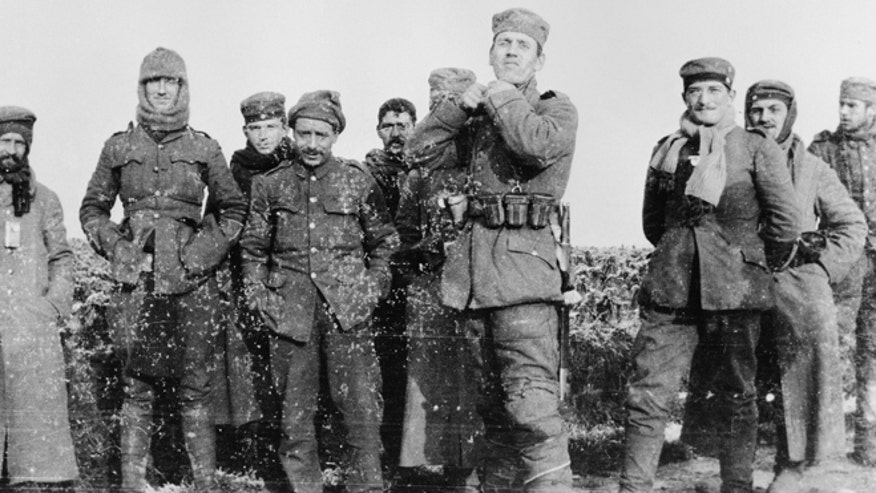‘I shall never forget it’: 100 years since WWI Christmas truce
"It was a beautiful moonlit night, frost on the ground, white almost everywhere: and at about 7 or 8 in the evening there was a lot of commotion in the German trenches and there were these lights -- I don't know what they were. And then they sang, "Silent Night" – "Stille Nacht." I shall never forget it, it was one of the highlights of my life. I thought, what a beautiful tune," Pvt. Albert Moren, a British soldier, wrote in a journal.
Soldiers, the number is hard to quantify but believed to be around 100,000, who had been killing each other by the tens of thousands for months, climbed out of their soggy trenches to seek a shred of humanity amid the horrors of war.
Hands reached out across a narrow divide, presents were exchanged, and in Flanders Fields a century ago, a spontaneous Christmas truce briefly lifted the human spirit.
"Not a shot was fired," Lt. Kurt Zehmisch of the 134th Saxony regiment wrote in his
diary that Christmas.
On the other side of the front line, Pvt. Henry Williamson of the London Rifle Brigade was amazed by the goodwill among his enemies.
Few could believe their eyes, on this patch of Belgium and northern France where crimson poppies had long ago shriveled in the cold. Peace allowed for dead bodies to be recovered from the fields and given a proper burial.
Fighting continued in many other places on the front line and some generals ordered the troops to get back into position and feared there was a softening. But it was a momentary peace in a war that would last for nearly four more years.
Frank and Maurice Wray of the London Rifle Brigade settled in to keep watch when they suddenly heard a German band in the trenches play songs "common to both nations," they later wrote in an article. "Quite understandably a wave of nostalgia passed over us."
At dawn, a German called out, "We good. We no shoot," and the Wrays noted: "And so was born an unofficial armistice." Men walked out, extremely apprehensive at first, many fearing some deadly trick. Then human warmth cracked the freezing cold.
Another said that at about 30 scattered points across many miles of Belgium, similar scenes occurred. Others happened across the Western Front, which ran from the North Sea to the Swiss border.
Apart from talk in a shared language or merely with hands and kindred eyes, the men exchanged gifts, using everything from bully beef and barrels of beer to small mementos. Some played soccer.
The New York Times identified the last survivor of the truce as Sgt. Alfred Anderson, from Scotland. He died in 2005 at 109. That same year, The Times ran a column noting some soldiers' journal entries
"We stood inside the circle like street corner orators. … What a sight -- little groups of Germans and British extending almost the length of our front! Out of the darkness we could hear laughter and see lighted matches, a German lighting a Scotchman's cigarette and vice versa, exchanging cigarettes and souvenirs," Cpl. John Ferguson, a Scottish troop, wrote.
German soldier Werner Keil scribbled his name on a piece of paper and gave a uniform button to 19-year-old British Cpl. Eric Rowden of the Queen's Westminster Rifles on Christmas Day 1914. "We laughed and joked together, having forgotten war altogether," Rowden wrote.
The Associated Press contributed to this report
Soldiers, the number is hard to quantify but believed to be around 100,000, who had been killing each other by the tens of thousands for months, climbed out of their soggy trenches to seek a shred of humanity amid the horrors of war.
Hands reached out across a narrow divide, presents were exchanged, and in Flanders Fields a century ago, a spontaneous Christmas truce briefly lifted the human spirit.
"Not a shot was fired," Lt. Kurt Zehmisch of the 134th Saxony regiment wrote in his
diary that Christmas.
On the other side of the front line, Pvt. Henry Williamson of the London Rifle Brigade was amazed by the goodwill among his enemies.
Few could believe their eyes, on this patch of Belgium and northern France where crimson poppies had long ago shriveled in the cold. Peace allowed for dead bodies to be recovered from the fields and given a proper burial.
Fighting continued in many other places on the front line and some generals ordered the troops to get back into position and feared there was a softening. But it was a momentary peace in a war that would last for nearly four more years.
Frank and Maurice Wray of the London Rifle Brigade settled in to keep watch when they suddenly heard a German band in the trenches play songs "common to both nations," they later wrote in an article. "Quite understandably a wave of nostalgia passed over us."
At dawn, a German called out, "We good. We no shoot," and the Wrays noted: "And so was born an unofficial armistice." Men walked out, extremely apprehensive at first, many fearing some deadly trick. Then human warmth cracked the freezing cold.
Another said that at about 30 scattered points across many miles of Belgium, similar scenes occurred. Others happened across the Western Front, which ran from the North Sea to the Swiss border.
Apart from talk in a shared language or merely with hands and kindred eyes, the men exchanged gifts, using everything from bully beef and barrels of beer to small mementos. Some played soccer.
The New York Times identified the last survivor of the truce as Sgt. Alfred Anderson, from Scotland. He died in 2005 at 109. That same year, The Times ran a column noting some soldiers' journal entries
"We stood inside the circle like street corner orators. … What a sight -- little groups of Germans and British extending almost the length of our front! Out of the darkness we could hear laughter and see lighted matches, a German lighting a Scotchman's cigarette and vice versa, exchanging cigarettes and souvenirs," Cpl. John Ferguson, a Scottish troop, wrote.
German soldier Werner Keil scribbled his name on a piece of paper and gave a uniform button to 19-year-old British Cpl. Eric Rowden of the Queen's Westminster Rifles on Christmas Day 1914. "We laughed and joked together, having forgotten war altogether," Rowden wrote.
The Associated Press contributed to this report






No comments:
Post a Comment